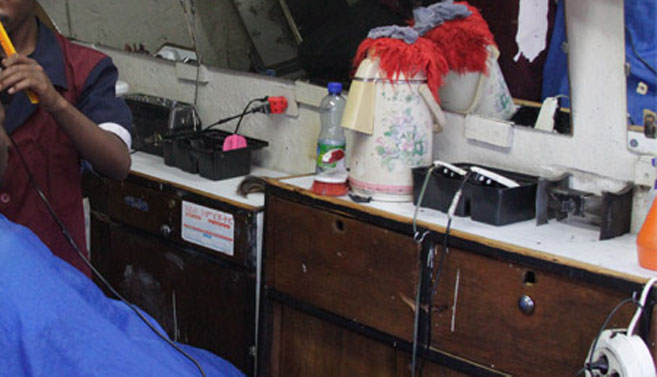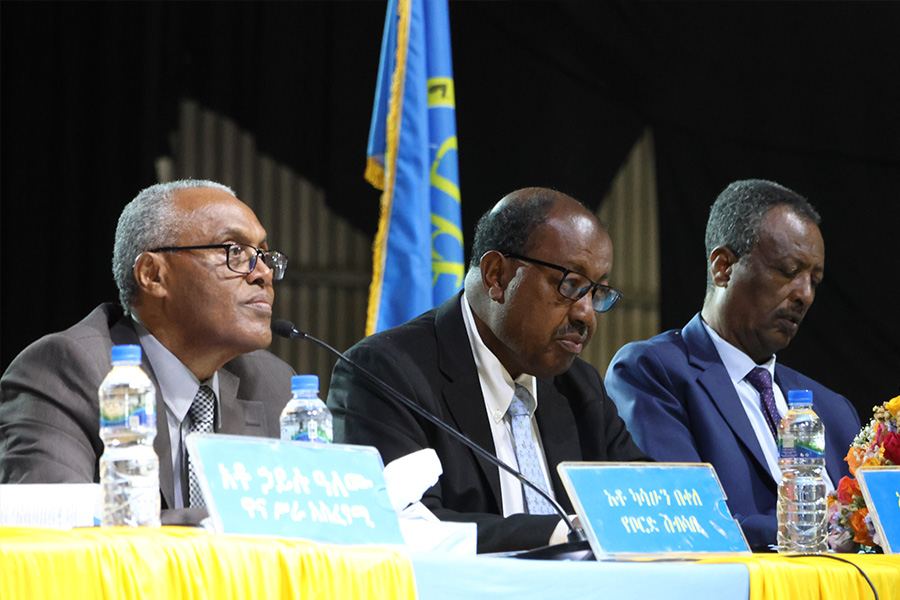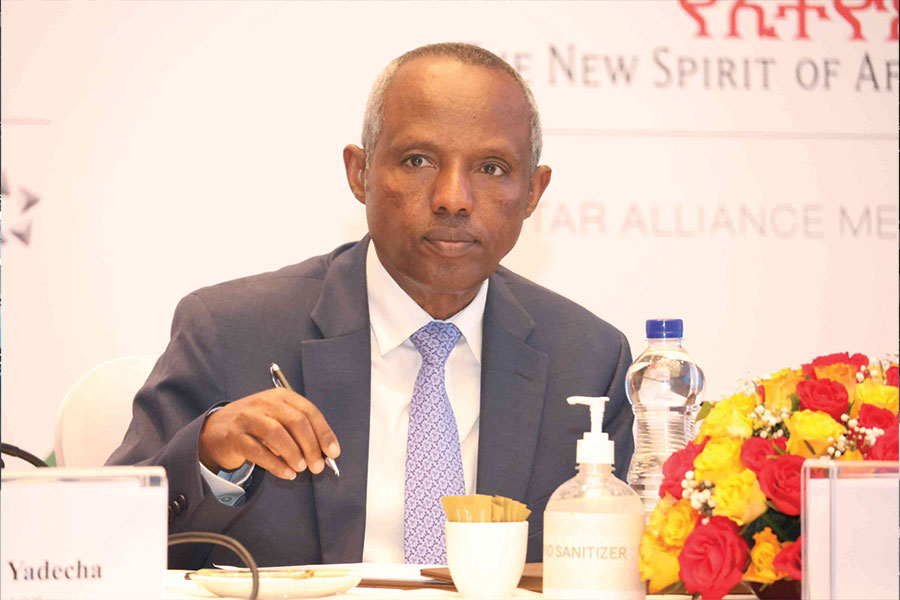
Fortune News | Jul 06,2019
Simon Derge has been running his small cyber cafe, Simon Internet Café, located around Lancha in Addis Abeba for the past four years.
His internet cafe, which provides convenience and ease of access to internet users, provides the sole income to Simon, who is in his twenties.
In addition to internet service, Simon downloads pirated movies on flash disks from torrent websites and sells them to his clients for two or three Br, depending on the types of movies he offers.
For the past four years, he has been paying 3,536 Br to the state monopoly telecom operator, Ethio-telecom, for broadband internet service with a speed of 2mbps.
The month of August this year brought much good cheer to Simon and those who use the services of the telecom giant. On August 22, 2018, the new CEO, Frehiwot Tamiru, announced dramatic tariff reductions for internet, voice call and text messages.
The company introduced a 40pc tariff cut on local mobile calls; a 43pc price reduction on texts; and a 43pc price decrease on mobile data services. The tariff cuts also included a 54pc slash on broadband internet service for residential customers.
The current price adjustments come after a seven-year hiatus in price adjustments.
These significant tariff adjustments have benefited Simon directly by reducing his operating expenses. His monthly fee for the broadband service went down to 2,400 Br.
However, Simon has not passed along the reductions in tariff prices he enjoys to his customers. Instead, the tariff reduction has taken his customers away as they start using mobile phones to access the internet.
"Most of my clients are coming to use my printing and binding services or to buy stationery material," Simon said.
The other major concern that worries him the most is the deterioration of the service quality of the internet after the discounts.
"The speed gets worse, day after day," he said, explaining that he could not even download a series of movies as he used to previously.
Another internet café owner shares Simon's concerns.
Ahead of a government plan to partially privatise the telecom monopoly, Ethio telecom has cut customer tariffs by 40pc or more.
"Since mid-September, the internet quality started to deteriorate," said Samira Mohamed of Supernova Internet Café, which is located in Summit area in Bole District.
Samira explains the quality of internet service is good every morning but begins to slow down in the afternoon so that any download of files becomes almost impossible.
Since the telecommunications service was introduced in the country in the late 20th century, the country has been ranked low for having a very limited number of internet and telecom users.
Users have mentioned that accessibility and affordability are the main factors that discourage internet usage.
Ethiopia had 17.87 million internet users with a penetration rate of 16.7pc. Neighbouring Kenya, meanwhile, enjoyed an internet penetration rate of 85pc and 43.3 million users during the same period.
"The ultimate reason for the tariff reduction is to live up to customers’ income capacity and help customers get telecom services at affordable prices," elaborated Abdurahim Ahmed Shaffi, Ethio telecom's head of corporate communications.
"We made the tariff adjustment to make the service available to everyone, including low income folks and students," he told Fortune.
Aklilu Melese is one of the low-income earners and one of the internet users. He works as a motorcycle delivery man. An internet user since 2014, Aklilu frequents Telegram, Facebook and YouTube as his most favourite services on the internet.
“I am happy about the discount for both the internet and voice packages," he says, explaining cheerfully that the discount has made him use the internet more frequently.
The tariff reduction has increased the number of subscribers, according to Frehiwot, who believes that the previous prices had pushed away potential customers.
“In the past, the public didn’t largely use our broadband internet service," she said, "but lately the number of subscribers has increased dramatically."
Abraham Minwuyelet, vice president at Websprix, one of eight companies that install downstream fixed-line internet service, shares her view.
"After the announcement of tariff reduction, the number of customers has increased," said Abraham, who co-founded Websprix with Dawit Brihanu in 2011.
Subsequent to Ethio telcom's tariff slash, Websprix made amendments to its packages. The company was charging 990 Br and 1,700 Br a month for internet packages with a speed of 1Mbps and 2Mbps, respectively. But it has since adjusted the price to 790 Br and 990 Br, respectively.
Still enjoying the bonanza of the price reduction, business users claim that the slowdown has affected their activities.
Samson Gashaw, a taxi driver in his late 50s, is a member of one of the taxi haling services, Ethiopian Taxi (ETTA). He claims that his business is affected by the internet quality problem.
On average, he says he spends 400 Br monthly to get internet service. Samson connects with his customers via a mobile application.
Using the application, customers just tap into the options and automatically see the available drivers, like Samson, that are within close proximity. They can then send their request to a driver and book their trip.
He has to stay online and logged into the application in order to be seen by potential clients.
"Due to the poor connection, the application doesn't even load these days," he said. "Therefore, I stay longer on the internet trying to be logged on to the system, which is costly."
"Beyond that, I am losing business," he complains.
This can not continue, according to Frehiwot, whose institution has been undergoing major changes as it prepares for the proposed partial privatisation scheme of the government.
Last June the executive committee of the ruling EPRDF announced the partial privatisation of state-owned enterprises such as Ethio telecom, Ethiopian Airlines, Ethiopian Shipping & Logistics Enterprise and Ethiopian Electric Power.
"We don't have a capacity and infrastructure problem," she said. "We just need to install more communication modems to meet the growing broadband demand."
“We are now in the process of procuring asymmetric digital subscriber line (ADSL) modems [a device used to connect a router to a digital subscriber for internet connectivity] to satisfy the demand,” says Frehiwot.
Beyond that, the company is increasing the bandwidth of the internet coming through Sudan, according to Frehiwot. It is also partnering with giant corporations such as YouTube to locally host their servers in Ethiopia, to decrease data traffic.
She stated that they are also working on a system that can enable users to top-up their balance electronically, or do the same at a point of sale in supermarkets, to eliminate having to buy physical top-up cards.
The other long-term solution is to expand network infrastructure across the nation, but the major focus will be in Addis Abeba and regional towns.
Yihenew Wondie (PhD), a lecturer at Addis Abeba University who had been working at Ethio telecom, sees a lack of proper assessment prior to enacting the tariff amendment as the main cause of the problem facing the company now.
"To minimise the problem, the company should increase its infrastructure like installing large and better internet servers," Yihenew says.
He also recommends that the company suspend registering new subscribers until the optimisation project is finalised.
"The problem is not only for users but also for the company as its revenues would decline," he adds.
However, the company is taking some steps as short-term solutions until major expansions are completed.
Effective resource utilisation is one of the methods currently utilised by the company as a solution for network congestion.
For instance, customers who have abandoned the service while still occupying space on the network and other system resources will be purged from the system, and the resource will be reassigned to new customers.
But this has to be supported by a reliable power supply, according to Ephrem Arefanie, Chief Marketing Officer of Ethio telecom.
"Without addressing the power supply problem, it is unthinkable to improve network availability and other quality parameters," he said.
Dialogue has been started, and agreement points have been articulated with the Ethiopian Electric Utilities (EEU). With this effort, Ethio telecom can address power issues and ultimately contribute to overall service improvement, according to Ephrem.
(MADEBO GIRMA, TEMESGEN MULUGATA AND GENET ASMAMAW have contributed to this story)
PUBLISHED ON
Nov 27,2018 [ VOL
19 , NO
970]

Fortune News | Jul 06,2019

View From Arada | May 18,2019

Radar | Oct 18,2025

Radar | Feb 01,2020

Fortune News | Mar 26,2022

Radar | Dec 15,2024

Fortune News | Oct 18,2025

Fortune News | Mar 02,2019

Fortune News | Aug 09,2025

My Opinion | Sep 03,2022

Dec 22 , 2024 . By TIZITA SHEWAFERAW
Charged with transforming colossal state-owned enterprises into modern and competitiv...

Aug 18 , 2024 . By AKSAH ITALO
Although predictable Yonas Zerihun's job in the ride-hailing service is not immune to...

Jul 28 , 2024 . By TIZITA SHEWAFERAW
Unhabitual, perhaps too many, Samuel Gebreyohannes, 38, used to occasionally enjoy a couple of beers at breakfast. However, he recently swit...

Jul 13 , 2024 . By AKSAH ITALO
Investors who rely on tractors, trucks, and field vehicles for commuting, transporting commodities, and f...

Oct 25 , 2025
The regulatory machinery is on overdrive. In only two years, no fewer than 35 new pro...

Oct 18 , 2025
The political establishment, notably the ruling party and its top brass, has become p...

Oct 11 , 2025
Ladislas Farago, a roving Associated Press (AP) correspondent, arrived in Ethiopia in...

Oct 4 , 2025
Eyob Tekalegn (PhD) had been in the Governor's chair for only weeks when, on Septembe...